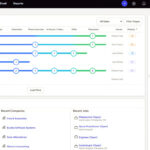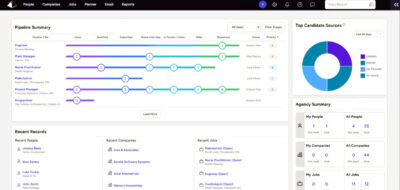In this bustling modern world of ours, technology has made significant inroads into the field of recruitment. Artificial Intelligence (AI) has emerged as a powerful tool for professional recruiters and search consultants, streamlining processes, improving efficiency, and enhancing decision-making. However, with great power comes great responsibility, and one of the most pressing concerns in AI-powered recruitment is the issue of artificial intelligence bias.
AI systems, if not carefully designed and monitored, can inadvertently perpetuate and amplify existing biases, leading to unfair and discriminatory hiring practices. In this comprehensive guide, we will explore the challenges associated with AI bias in recruitment and present possible solutions that professional recruiters and search consultants can implement to overcome these challenges.
Challenges of Artificial Intelligence Bias in Recruitment
There are multiple challenges in terms of artificial intelligence bias. They include data bias, algorithmic bias, feedback loop bias, lack of diversity in the tech industry, inadequate explainability, and legal and ethical concerns.
Let’s examine each of these challenges indvidually:
Data Bias
Professional recruiters and search consultants are facing the challenge of evaluating candidates’ suitability for remote and hybrid work arrangements, which have become increasingly prevalent in the wake of the COVID-19 pandemic. Adapting to remote or hybrid work environments requires a unique set of skills and attributes, making it essential for recruiters to assess candidates’ ability to thrive in these settings effectively.
Scenario-Based Assessments
Incorporating scenario-based questions into interviews allows recruiters to evaluate candidates’ experience with remote work and their ability to navigate virtual collaboration. By presenting candidates with hypothetical situations relevant to remote or hybrid work environments, recruiters can assess their problem-solving skills, communication abilities, and capacity to manage remote teams effectively.
Remote Onboarding
Developing a streamlined onboarding process specifically tailored for remote hires is crucial for ensuring a smooth transition into the organization. Providing comprehensive training materials, assigning mentors or buddies, and scheduling regular check-ins can help remote employees acclimate to their new roles and establish connections with colleagues despite physical distance.
Flexibility and Adaptability
Assessing candidates’ flexibility and adaptability in the context of changing work arrangements is essential for identifying individuals who can thrive in dynamic and uncertain environments. Recruiters should look for evidence of candidates’ ability to pivot quickly, embrace new technologies, and collaborate effectively across distributed teams.
By leveraging scenario-based assessments, implementing remote onboarding processes, and evaluating candidates’ flexibility and adaptability, professional recruiters and search consultants can effectively address the challenges associated with remote and hybrid work arrangements. By identifying candidates who demonstrate the necessary skills and attributes to excel in virtual environments, recruiters can help organizations build resilient and high-performing teams capable of thriving in today’s evolving work landscape.
Algorithmic Bias
As professional recruiters and search consultants navigate the use of artificial intelligence (AI) in recruitment processes, they encounter the challenge of combating algorithmic bias. AI recruitment systems, powered by algorithms, have the potential to introduce bias due to their design or the features they consider when making hiring recommendations. This bias can perpetuate inequalities and hinder efforts to build diverse and inclusive workplaces.
One common source of bias in AI recruitment systems is the consideration of factors that correlate with socioeconomic status or race, such as ZIP code. Algorithms that incorporate these factors may inadvertently favor certain demographic groups over others, perpetuating existing disparities in employment opportunities.
To address this challenge, professional recruiters and search consultants must advocate for transparent algorithm design and fairness testing in AI recruitment systems. By working closely with data scientists and AI developers, recruiters can ensure that algorithmic decision-making processes are transparent and accountable. This involves specifying clear criteria for fairness and equity in algorithm design and implementation.
Implementing fairness testing is essential for identifying and mitigating algorithmic biases. Recruiters should continuously monitor the performance of AI recruitment systems and evaluate the impact of different features on hiring decisions. By systematically testing for fairness and bias, recruiters can identify areas where algorithmic decisions may disproportionately disadvantage certain groups and take corrective action to rectify these issues.
By prioritizing transparent algorithm design and fairness testing, professional recruiters and search consultants can mitigate the risks of algorithmic bias in recruitment processes. And by extensionBy promoting fairness and equity in AI-driven hiring practices, recruiters can contribute to building more diverse, inclusive, and equitable workplaces.
Feedback Loop Bias
As professional recruiters and search consultants grapple with the integration of artificial intelligence (AI) into recruitment processes, they face the challenge of combating feedback loop bias. AI systems rely on feedback to refine their algorithms and improve accuracy over time. However, if an AI system is initially biased, it can perpetuate and even exacerbate bias through the feedback it receives.
Feedback loop bias occurs when biased decisions made by recruiters are reinforced and amplified by the AI system’s recommendations. For instance, if a recruiter consistently rejects candidates from underrepresented backgrounds based on biased AI recommendations, the AI system may learn to further discriminate against similar candidates in the future, thus reinforcing the bias in its recommendations.
To address this challenge, professional recruiters and search consultants must prioritize human oversight and intervention in the decision-making process. While AI systems can offer valuable insights and efficiency, they should not replace the judgment and discernment of human recruiters. Recruiters should closely monitor AI recommendations and exercise their judgment to ensure fair and unbiased outcomes throughout the recruitment process.
Maintaining a strong human presence in the decision-making process allows recruiters to challenge and question AI recommendations that may exhibit bias. Regularly reviewing and adjusting the AI system’s recommendations based on human judgment can help break the cycle of bias and promote fairness in recruitment decisions.
By prioritizing human oversight and intervention, professional recruiters and search consultants can mitigate the risks of feedback loop bias in AI-driven recruitment processes. By actively engaging with AI recommendations and exercising their judgment, recruiters can uphold fairness and equity in hiring outcomes, ultimately contributing to the creation of diverse and inclusive workplaces.
Lack of Diversity in Tech Industry
The lack of diversity in the tech industry poses a significant challenge in combating artificial intelligence (AI) bias for professional recruiters and search consultants. Given that the tech sector is a primary driver of AI development, the homogeneity of its workforce can lead to the creation of AI systems with inherent biases that reflect the perspectives and experiences of the majority group. This lack of diversity among developers and data scientists can perpetuate and exacerbate bias in AI-powered recruitment processes.
To address this challenge, professional recruiters and search consultants can advocate for and collaborate with organizations and AI developers that prioritize diversity and inclusion in their teams. By promoting diverse development teams, recruiters can ensure that a variety of perspectives and experiences are represented in the creation and refinement of AI algorithms.
Diverse development teams are better equipped to recognize and mitigate bias in AI systems effectively. Individuals from different backgrounds and underrepresented groups can offer valuable insights into potential sources of bias and advocate for fair and inclusive algorithms. By fostering a culture of diversity and inclusion within AI development teams, organizations can promote the creation of AI systems that are more equitable and less prone to perpetuating biases in recruitment processes.
Collaborating with organizations that prioritize diversity and inclusion in AI development teams allows professional recruiters and search consultants to contribute to the creation of more ethical and unbiased AI-powered recruitment solutions. By championing diversity in technology development, recruiters can play a vital role in advancing fairness and equity in AI-driven hiring practices, ultimately contributing to the creation of more diverse and inclusive workplaces.
Inadequate Explainability
Professional recruiters and search consultants encounter the challenge of inadequate explainability in combating artificial intelligence (AI) bias. AI algorithms, often complex and opaque, can make it difficult to understand and interpret the basis of their recommendations. This lack of transparency can lead to distrust and potential bias-related issues when recruiters or candidates question the rationale behind AI recommendations.
To address this challenge, professional recruiters and search consultants can advocate for the implementation of Explainable AI (XAI) techniques. XAI techniques aim to make AI systems more transparent and interpretable, allowing users to understand why specific recommendations are made. By providing transparency into the decision-making process of AI algorithms, XAI techniques enhance trust and accountability in AI-powered recruitment processes.
One example of XAI is OpenAI’s GPT-3.5, which offers the option to generate human-readable explanations for its outputs. This feature enables recruiters and search consultants to understand and communicate the reasoning behind AI-generated recommendations to stakeholders effectively. XAI techniques empower recruiters to address concerns about bias and make informed decisions based on AI recommendations.
By advocating for the adoption of XAI techniques and promoting transparency in AI-powered recruitment processes, professional recruiters and search consultants can mitigate the challenges associated with inadequate explainability. By enhancing understanding and trust in AI systems, XAI techniques enable recruiters to leverage the benefits of AI while minimizing the risks of bias and promoting fairness in recruitment outcomes.
Legal and Ethical Concerns
Professional recruiters and search consultants confront significant legal and ethical concerns when combating artificial intelligence (AI) bias in recruitment processes. The implications of biased AI algorithms extend beyond mere inefficiency; they can lead to serious legal repercussions and ethical dilemmas. Discriminatory hiring practices resulting from AI bias may lead to lawsuits, damage to a company’s reputation, and erosion of trust among candidates and employees.
To address these challenges, professional recruiters and search consultants must prioritize legal compliance and adherence to ethical guidelines in AI-powered recruitment processes. It is crucial for recruiters to stay well-versed in relevant anti-discrimination laws and regulations, such as the Equal Employment Opportunity Commission (EEOC) guidelines in the United States, and ensure that their AI systems comply with these legal frameworks. This involves understanding the legal requirements for fair hiring practices and taking proactive measures to mitigate bias in AI algorithms.
In addition, recruiters should adhere to ethical guidelines that prioritize fairness, equality, and transparency in AI-powered recruitment. This includes establishing clear policies and procedures for ensuring fairness in the recruitment process, regularly auditing AI algorithms for bias, and implementing mechanisms for accountability and oversight.
By prioritizing legal compliance and ethical guidelines, professional recruiters and search consultants can mitigate the legal and ethical risks associated with AI bias in recruitment. By upholding principles of fairness and equality, recruiters can build trust with candidates and employees, strengthen their employer brand, and contribute to creating a more inclusive and equitable workplace.
Solutions for Artificial Intelligence Bias in Recruitment
Continuous Monitoring and Evaluation: Regularly assess and evaluate the performance of AI recruitment systems to identify and rectify biases. Use metrics and key performance indicators (KPIs) to measure fairness and equality in hiring outcomes. Adjust algorithms and data as necessary to improve results.
Bias Mitigation Techniques: Implement bias mitigation techniques, such as re-weighting or re-sampling data, to ensure that underrepresented groups are not disadvantaged by the AI system. Experiment with different techniques and strategies to minimize bias effectively.
Diversity and Inclusion Training: Provide training to AI developers, recruiters, and search consultants on diversity and inclusion best practices. Ensure that they understand the potential pitfalls of bias in recruitment and the importance of mitigating it.
Candidate Feedback: Encourage candidates to provide feedback on their experiences with AI-powered recruitment processes. Use this feedback to improve the system and address any issues that may arise.
External Audits: Consider enlisting third-party auditors or experts in AI fairness to conduct regular audits of your AI recruitment system. External audits can provide an objective assessment of bias and help build trust with candidates and stakeholders.
Legal and Ethical Oversight: Work closely with legal and compliance teams to ensure that your AI recruitment practices align with relevant laws and ethical guidelines. Seek legal counsel to review and validate your AI systems.
Diverse Talent Acquisition: Actively seek out and engage with diverse talent pools to ensure that your data and AI models reflect a broad range of backgrounds and experiences.
Collaboration with Industry Peers: Collaborate with other professional recruiters and search consultants to share best practices and insights on addressing AI bias in recruitment. A collective effort can lead to better solutions.
Transparency and Accountability: Promote transparency in AI-powered recruitment processes by clearly communicating the role of AI in decision-making. Establish accountability mechanisms and designate responsible individuals or teams for overseeing AI systems.
Inclusive Decision-Making: Involve a diverse group of stakeholders, including candidates, in the decision-making process for AI system design and deployment. Ensure that the system’s goals align with fairness and equality.
The Final Word on Artificial Intelligence Bias
AI-powered recruitment offers immense potential for professional recruiters and search consultants, but it also comes with the responsibility of addressing and mitigating bias. By understanding the challenges associated with AI bias and implementing the solutions outlined in this guide, recruiters can build fair, transparent, and effective AI systems that benefit both employers and job seekers.
Addressing AI bias is not only a legal and ethical imperative but also a strategic advantage, as diverse and inclusive hiring practices lead to better business outcomes and a stronger, more equitable workforce. As technology continues to evolve, professional recruiters and search consultants must stay vigilant, adapt, and prioritize fairness to ensure that AI remains a valuable tool in the world of recruitment!









